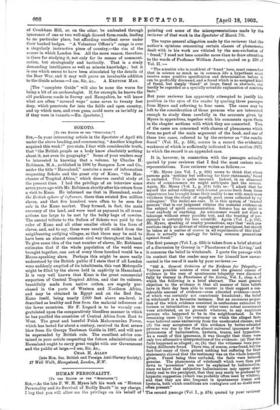SOKOTO.
[To THE EDITOR OT THE "SPECTATOR."1 Sin,—In your interesting article in the Spectator of April 4th under the above heading, and commencing, "Another kingdom acquired this week!" you state, I fear with considerable truth, that "the British people as a body know absolutely nothing about it, not even its geography." Some of your readers may be interested in knowing that a volume, by Charles H. Robinson, M.A., published in 1896 by Sampson Low and Co., under the title "Hausaland," contains a mass of information respecting Sokoto and the great city of Kano, "the Man- chester of Tropical Africa," which deserves careful study at the present time. I had the privilege of an interview some seven years ago with Mr. Robinson shortly after his return from a visit to Kano. He informed me that in Hausaland, under the British sphere of influence, there then existed .five million slaves, and that five hundred were often to be seen for sale in the Kano market. They formed, in fact, the main currency of the land, and were used as payment in all trans- actions too large to be met by the bulky bags of cowries. The annual tribute to the Sultan of Sokoto was paid by the ruler of Kano and all other smaller chiefs in the form of slaves, and, sad to say, these were nearly all raided from the neighbouring outlying villages, so that there may be said to have been an almost constant civil war throughout the land. To give some idea of the vast number of slaves, Mr. Robinson e'stimates that if the whole population of the world were brought together, one out of every three hundred would be a Hausa-speaking slave. Perhaps this might be more easily understood by the British public if I state that if all London were suddenly emptied of its inhabitants, this vast Metropolis might be filled by the slaves held in captivity in Hausaland. It is very well known that Kano is the great commercial emporium of Central Tropical Africa, and that its calicoes, beautifully made from native cotton, are eagerly pur- chased in the ports of Western and Northern Africa, and may be obtained in Egypt and on the Red Sea. Kano itself, being nearly 2,000 feet above sea-level, is described as healthy and free from the malarial influences of the lower countries. Sir F. Lugard is to be warmly con- gratulated upon the comparatively bloodless manner in which he has pacified the countries of Central Africa from East to West. The great and baneful Fulah Mahommedan Power, which has lasted for about a century, received its first severe blow from Sir George Taubman Goldie in 1897, and will now be superseded by British rule. The excellent advice con- tained in your article respecting the future administration of Hausaland ought to carry great weight with our Government and the public at large.—I am, Sir, &c., Ones. H. ALLEN (late Hon. Sec. British and Foreign Anti-Slavery Society). 17 Well Walk, Hampstead, London, W.






































 Previous page
Previous page